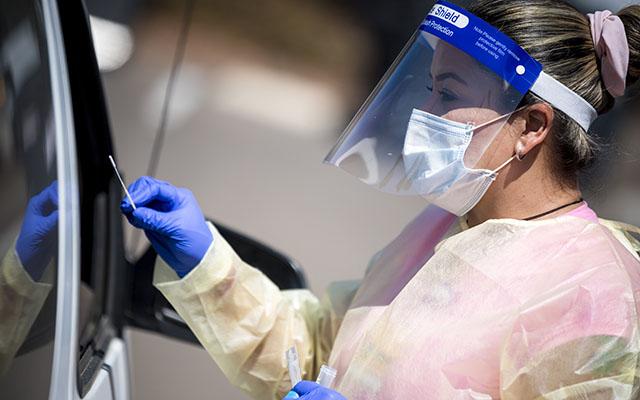University of California San Diego was awarded five Rapid Acceleration of Diagnostics (RADx) projects by the National Institutes of Health (NIH), totaling nearly $33 million over four years. The purpose of the RADx initiative is to speed innovation in the development, commercialization and implementation of technologies for COVID-19 testing.
There are several programs within the RADx initiative, including the RADx Underserved Populations (RADx-UP) program, which funds projects aimed at understanding why some communities are disproportionately affected by COVID-19 and reducing the factors associated with these disparities, and the RADx Radical (RADx-rad) program, which supports innovative approaches to addressing gaps in COVID-19 testing.
“The RADx program responds to the nation’s need for innovative solutions in diagnostic technologies that are people-centric, and utilize expertise in infectious diseases, informatics, data science, clinical pathology, bioengineering and many other related areas,” said Lucila Ohno-Machado, MD, PhD, chair of the Department of Biomedical Informatics at UC San Diego Health. “It includes, for example, artificial intelligence models that will help detect and prognosticate disease using novel sensors. Lessons learned from the current focus on COVID-19 will be leveraged in many other health sciences challenges, and data will be shared to accelerate other discoveries.”
UC San Diego’s RADx-rad and RADx-UP projects include:
RADx-rad Discoveries & Data: Consortium Coordination Center Program Organization
Project Leaders: Lucila Ohno-Machado, MD, PhD, chair of the Department of Biomedical Informatics at UC San Diego Health, professor of medicine and associate dean for informatics and technology at UC San Diego School of Medicine, and founding faculty member of UC San Diego Halicio?lu Data Science Institute; Eliah Aronoff-Spencer, MD, PhD, assistant professor of medicine at UC San Diego School of Medicine and Qualcomm Institute at UC San Diego; Hua Xu, PhD, of University of Texas Health.
Amount: $23,817,692 over four years
This project will use advanced data management to coordinate a consortium of innovative COVID-¬19 diagnostic technology developers. The partnership between UC San Diego and the University of Texas Health Science Center at Houston brings together informatics/data scientists and infectious diseases specialists who will standardize viral samples, testing and procedures and data, in order to integrate and share data in a meaningful manner.
Harnessing Technological Innovation and Community-Engaged Implementation Science to Optimize COVID-19 Testing for Women and Children in Underserved Communities
Project Leaders: Robert Tukey, PhD, professor of pharmacology at UC San Diego School of Medicine; Louise Laurent, MD, PhD, professor of obstetrics, gynecology and reproductive sciences, vice chair for translational research and director of perinatal research at UC San Diego School of Medicine
Amount: $4,970,492 over two years
This study seeks to maximize COVID-19 testing among pregnant women and children in an area of San Diego near the United States-Mexico border that has been noted to have the highest local incidence of COVID-19.
COVID-19 testing in Underserved and Vulnerable Populations Receiving Care in San Diego Community Health Centers
Project Leaders: Jesse Nodora, DrPH, associate professor in the Herbert Wertheim School of Public Health and Human Longevity Science and director of Community Engagement at the Altman Clinical and Translational Research Institute at UC San Diego; Linda Hill, MD, professor, Herbert Wertheim School of Public Health; María Elena Martínez, PhD, professor in the Herbert Wertheim School of Public Health, Sam M. Walton Endowed Chair for Cancer Research, and associate director of Population Science, Disparities and Community Engagement at UC San Diego Moores Cancer Center
Amount: $1,692,794 over two years
In partnership with Health Quality Partners of Southern California and the laboratory of Louise Laurent, MD, PhD, at UC San Diego School of Medicine, the study will develop, test and evaluate a rapid, scalable capacity building project to enhance COVID-19 testing in three regional community health centers in San Diego County. Testing will be conducted among asymptomatic individuals who are at increased risk for severe COVID illness. Investigators will also gather insights from patients, providers, health center leadership and community stakeholders to establish best practices for future scale-up of COVID-19 testing sustainability and vaccination.
Diagnosing and Predicting Risk in Children with SARS-CoV-2- Related Illness
Project Leader: Jane Burns, MD, pediatrician at Rady Children’s Hospital-San Diego and director of the Kawasaki Disease Research Center at UC San Diego School of Medicine
Amount: $1,396,830 over two years
This project will define the antibody repertoire against all known human coronaviruses and determine how pre-existing antibodies to other coronaviruses may shape the immune response in acuteSARS-CoV-2 infection and multisystem inflammatory syndrome in children.
Validation of Smart Masks for Surveillance of COVID-19
Project Leader: Jesse Jokerst, PhD, professor of nanoengineering at UC San Diego Jacobs School of Engineering
Amount: $1,045,704 over three years
This project will develop a “smart mask” that changes colors when exposed to enzymes of COVID-19 (Mpro and PLP proteases specific to the SARS viruses) found in saliva. The mask concentrates them from aerosolized saliva when the subject breathes and speaks. Biobank saliva samples are being leveraged to help determine the specificity of the mask.


